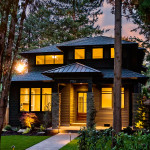Twelve years ago, the U.S. Green Building Council launched a rating system called LEED, or Leadership in Energy and Environmental Design, hoping that architects, engineers, designers and real estate firms would improve energy efficiency and increase the use of recycled materials and nontoxic paint in their projects to win LEED-certified recognition.
Now LEED has grown into a powerful brand and global phenomenon. There are 14,044 LEED-certified commercial projects, covering more than 2 billion square feet, in 140 countries. Another 34,601 projects are in the pipeline.
“Green building is not a curiosity anymore — it’s a huge market,” said Aditya Ranade, a senior analyst with Lux Research inBoston. “The green building sector will be a $280 billion global industry by the end of the decade. LEED is dominant around the world, but there are other standards.
The Green Building Council offers four levels of LEED certificates. They range from certified, in which 50% of the requirements are met, to platinum, in which at least 80% are met. Facebook’s data center inPrineville, Ore., for example, achieved LEED gold status.
But as LEED has grown and green building technology evolves, so has the need to update the rating system. The Green Building Council, a nonprofit with 14,000 member companies, on Tuesday will release proposed changes known as LEED v4 that member companies can comment on. The draft changes, include increased technical rigor for energy performance and new categories that focus on integrated design, life cycle analysis of materials used and issues like indoor air quality.
“In order for LEED to be relevant, it has to evolve,” said council spokeswoman Ashley Katz. “In 2000, people didn’t know what low VOC (volatile organic compounds) paint was. Now it’s what everyone uses.”
The original idea behind LEED was to make buildings more energy efficient and reduce the carbon footprint of the built environment. But LEED-certified buildings, which are often filled with natural sunlight and access to fresh air, have proved to be popular with employees, improving concentration and boosting productivity.
Read the entire article at Contra Costa Times | By Dana Hull | Posted 10/01/12
Renaissance Homes is an award winning Street of Dreams custom home builder specializing in green building, remodeling and renovations for the Portland market. Visit our Design Studio to personalize your next home.
Awarded the Portland Homebuilder’s Association 2011 “Builder of the Year.”



